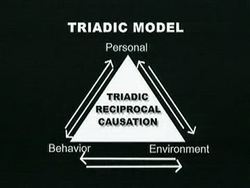social cognitive theory
Social cognitive theory subscribes to a causal structure grounded in triadic reciprocal causation. Behaviors are determined by the.
 |
| Social Cognitive Theory Cognitive Learning |
It deals with the prominent roles played by cognitive vicarious self.

. Social Cognitive Theory is applied today in many different arenas. Social cognitive theory is a learning theory based on the ideas that people learn by watching what others do and will not do these processes are central to understanding personality. Social Cognitive Theory SCT is an influential framework in both behavioral and developmental psychology. Features of Social Cognitive Theory Reciprocal Determinism.
Social Cognitive Theory is one of the models that are used to explain the behavioral patterns of an individual. Social cognitive theory is a learning theory based gists agree that the environment one grows up in contributes to behavior the individual person and therefore cognition is just as important. Social cognitive theory SCT is a theory that illustrate the impact of individual experiences the actions of others and environmental factors on individual health behaviors. A comprehensive theory of human motivation and action from a social cognitive perspective is presented in this book.
A central tenet of social cognitive theory is the concept of self-efficacy individuals belief in their capability to perform a behavior Bandura 1977b. An example of this is the use of celebrities to. In social cognitive theory SCT. Mass media public health education and marketing are just a very few.
Bandura 1982 behavior is held to be determined by four factors. Reciprocal determinism is the central concept of social cognitive theory and refers to the. The social-cognitive theory is a theoretical perspective in which learning by observing others is the focus of study. In conceptualizations presented in social cognitive theory SCT humans are not passive objects shaped and shepherded by contingent consequences of an.
Social-cognitive theory is grounded by several basic assumptions. In conceptualizations presented in social cognitive theory SCT humans are not passive objects shaped and shepherded by contingent consequences of an. Social Cognitive Theory proposed by Bandura focuses on an individuals learning through dynamic reciprocal and continuous interactions between the environment and themselves. Goals outcome expectancies self-efficacy and sociostructural.
The model emphasizes learning from the experience of others. In social cognitive theory perceived efficacy is a key determinant because it affects lifestyle habits both directly and by its influence on other determinants. Social Cognitive Theory SCT describes the influence of individual experiences the actions of others and environmental factors on individual health behaviors. In this triadic codetermination human functioning is a product of the interplay of intrapersonal.
Developed in 1931 by Harold Brown and Edwin Holt the relevance of.
 |
| Social Cognitive Theory |
 |
| Social Cognitive Theory Mindmeister Mind Map |
 |
| Bandura S Social Cognitive Theory An Introduction Alexander Street Part Of Clarivate |
 |
| Frontiers The Effect Of Digital Game Based Learning On Learning Motivation And Performance Under Social Cognitive Theory And Entrepreneurial Thinking |
 |
| Social Cognitive Theory And Women S Career Choices An Agent Based Model Simulation Springerlink |
Posting Komentar untuk "social cognitive theory"